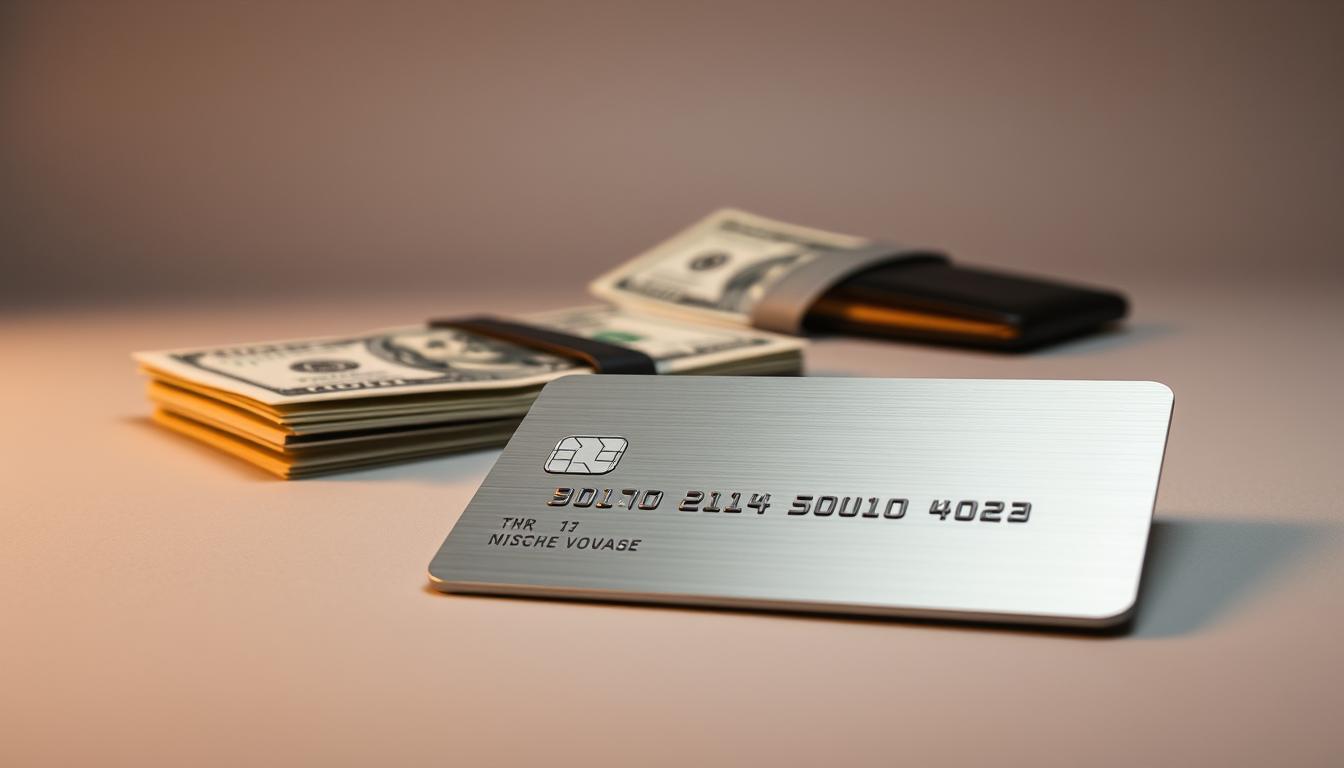Thinking about getting a credit card but don’t know where to begin? You’re not alone. Many see credit cards as key to building their financial future.
Used right, a credit card can help manage your money, earn rewards, and even boost your credit score. But, it’s easy to cross the line and end up in debt. It’s crucial to know how to use your card wisely to steer clear of common traps.
By understanding credit cards, you can pick the right one for you and use it well.
Key Takeaways
- Understand the basics of credit cards and their role in personal finance.
- Learn how to choose the best credit card for your needs.
- Discover strategies for using your credit card responsibly.
- Avoid common mistakes that can lead to debt.
- Maximize the benefits of your credit card, such as rewards and credit score improvement.
Understanding Credit Cards: The Basics
To get the most out of credit cards, you need to understand the basics. They’re not just for paying bills; they’re a financial tool with many benefits. Used right, they can really help your finances.
What Is a Credit Card and How Does It Work?
A credit card lets you borrow money to buy things, pay bills, or get cash. You must pay back what you borrow, usually with interest, by the due date to avoid extra fees. The card issuer pays the merchant first, and then you pay them back.

Different Types of Credit Cards Available
There are many credit cards for different needs. Here are a few:
- Secured credit cards need a deposit that becomes your credit limit.
- Unsecured credit cards don’t need a deposit but might have higher interest.
- Rewards credit cards give cashback, points, or travel miles.
- Balance transfer credit cards are great for paying off debt.
Key Terms Every Credit Card User Should Know
Knowing key terms is key to using your credit card wisely. Some important ones are:
- APR (Annual Percentage Rate): The interest rate on your balance.
- Credit Limit: The most you can charge on your card.
- Billing Cycle: The time between when you get your bill and when you pay it.
As Consumer Reports says, “Knowing these terms can help you avoid costly mistakes and make the most of your credit card benefits.”
The Benefits of Using a Credit Card Responsibly
Credit cards can be very helpful if used correctly. They offer many advantages that can improve your financial health. By understanding and using these benefits, you can get the most out of your credit card.
Building Your Credit Score
One big plus of using a credit card wisely is improving your credit score. Your credit score is key for getting loans and credit later. By paying on time and keeping your credit use low, you can boost your score.

Purchase Protection and Extended Warranties
Many credit cards give you purchase protection and extended warranties. Purchase protection can help if your item gets stolen or damaged. Extended warranties extend the time of the manufacturer’s warranty, giving you more peace of mind.
Fraud Protection and Security Features
Credit cards also have strong fraud protection and security. They offer zero-liability policies, so you’re not responsible for unauthorized charges. Plus, they have features like transaction alerts and biometric authentication to keep your account safe.
By using these benefits, you can enjoy the benefits of credit cards while avoiding risks.
How to Choose the Right Credit Card for Your Needs
Finding the right credit card is key to getting the most out of it. It’s about picking one that fits your financial needs and goals. With many options, you need to think about your spending and what you want from your card.
Assessing Your Spending Habits and Financial Goals
To find the best credit card, first look at your monthly spending and goals. Do you want rewards, to build credit, or finance big buys? Knowing your spending and goals helps you find the right card.
Comparing Credit Card Offers and Terms
After knowing your spending and goals, compare credit card offers. Don’t just look at the intro APR. Check annual fees, foreign transaction fees, and rewards programs. A detailed credit card comparison will show you the best card for your money.
When comparing, read the fine print. Some cards may have great bonuses or rewards, but watch out for hidden fees or limits.
Specialized Cards: Travel, Cashback, and Store Cards
There are many credit cards for different needs, like travel, cashback, or store cards. For example, travel cards offer airline miles or hotel points if you travel a lot. Cashback cards give you rewards in cash if you like simple rewards.
By understanding your spending, comparing credit card offers, and knowing the terms, you can pick a card that meets your financial needs. It will also help improve your financial health.
Credit Card Options for Beginners
Starting your credit journey means picking the right credit card. There are many options for beginners. It’s important to know the types of cards that can help you build a good credit history.
Secured Credit Card: A Great Starting Point
A secured credit card is perfect for those new to credit or with limited history. You need to put down a deposit, which becomes your credit limit. This makes it easier to get approved. Using it wisely can help you build credit over time.
Student Credit Card Benefits and Features
For students, a student credit card is a good choice. These cards have easier approval and offer benefits like cashback or discounts. They help students start building credit while in school.
Building Credit History with Your First Card
Choosing a secured or student card is just the start. Using your first card well is crucial for building a positive credit history. Pay on time, keep your balance low, and check your credit report often. This ensures you’re on the right path.
By picking the right card and using it smartly, you can set yourself up for financial success. This will open doors to better credit opportunities in the future.
The Application Process: What to Expect
Applying for a credit card might seem hard, but knowing the steps can make it easier. First, it’s important to know what affects your application.
Checking Your Credit Score Before You Apply
Your credit score is key in getting your credit card approved. Checking your credit score beforehand helps you know your chances. You can get a free report from Experian, TransUnion, and Equifax once a year at AnnualCreditReport.com. A good score can also get you better rates and terms.
Required Information and Documentation
When you apply for a credit card, you’ll need to give personal and financial details. This includes your name, address, Social Security number, income, and job info. Having this ready can make the process faster. Some issuers might ask for more, like proof of income or ID.
Understanding Approval Decisions and Next Steps
After you apply, the issuer will check your credit and decide. If you’re approved, you’ll get your card with details on your limit, rate, and terms. If not, you’ll get a letter explaining why. You can then work on improving your score or try for another card.
| Application Status | Possible Outcomes | Next Steps |
|---|---|---|
| Approved | Receive credit card with terms | Review terms, activate card, and start using it |
| Denied | Receive letter with reasons | Improve credit score or apply for a different card |
By knowing the application process and being ready, you can boost your chances of getting a credit card.
Credit Card Rewards and Benefits Worth Knowing
Getting the most out of your credit card is more than just buying things. It’s about using the rewards and benefits it offers. As a card user, you can join many rewards programs that make your money go further.
Types of Reward Programs
Credit card rewards come in points, miles, and cashback. Points can be used for gifts, merchandise, or credits. Miles help with travel, like booking flights or hotels. Cashback gives you a percentage of your spending back.
Strategies for Earning Maximum Rewards
To get the most rewards, know how your card works. Use it for everyday buys and take advantage of special categories like dining or gas. Also, watch for special offers that can increase your rewards.
Hidden Benefits Many Cardholders Miss
Many credit cards have secret benefits that can protect your money and travel. One is travel insurance, which covers trip problems.
Travel Perks and Insurance Coverage
Some cards offer travel perks like lounge access and travel help. They also have insurance for rental cars, trip cancellations, or lost bags. Knowing these can save you money and stress when you travel.
| Benefit | Description | Typical Cards Offering This Benefit |
|---|---|---|
| Travel Insurance | Covers trip cancellations, interruptions, or delays | Premium Travel Cards |
| Airport Lounge Access | Provides a comfortable space to relax before flights | Elite Travel Rewards Cards |
| Rental Car Insurance | Covers damages or theft of rental vehicles | Many Premium Cards |
By using these rewards and benefits, you can make your credit card more valuable. It becomes a tool that saves you money and makes your life easier.
Understanding Your Credit Card Interest Rates
It’s key to understand credit card interest rates to manage your money well. If you’re not careful, these rates can quickly increase your debt. This can turn a small debt into a big financial problem.
APR Explained: Fixed vs. Variable Rates
The Annual Percentage Rate (APR) is the interest rate on your credit card balance if you don’t pay it all. It’s important to know the difference between fixed and variable APRs. A fixed APR stays the same unless the issuer changes it. On the other hand, a variable APR can change with the market.
Variable APRs often link to the Prime Rate. This means they can go up or down with the Prime Rate. Always check your credit card agreement to see how your APR is set.
Common Fees to Watch Out For
Credit cards also have fees that can increase your debt. Common fees include late fees, balance transfer fees, and foreign transaction fees. Knowing about these fees can help you avoid extra charges.
- Late fees: Charged when you miss your payment due date.
- Balance transfer fees: Applied when you transfer a balance from one card to another.
- Foreign transaction fees: Incurred when you make purchases abroad or in foreign currencies.
How Interest Is Calculated on Your Balance
Interest on your credit card is based on your average daily balance. The issuer calculates the daily interest by multiplying the daily balance by the daily periodic rate (APR divided by 365). Knowing this can help you manage your payments better.
By understanding credit card interest rates, you can make better choices. This can help you save money on interest charges.
Smart Credit Card Management Strategies
To get the most out of your credit card, smart management is key. Good management helps you avoid debt and enjoy your card’s benefits fully.
Creating a Payment Plan and Schedule
Creating a payment plan is crucial. It means setting a budget you can stick to. Here’s how:
- Determine how much you can pay each month
- Choose a payment date that fits your income
- Use automatic payments to dodge late fees
Tracking Your Spending Effectively
It’s important to track your spending. This helps you avoid overspending and get the most from rewards. Use:
- Online banking to watch your transactions
- Mobile apps for on-the-go tracking
- Spreadsheets to organize and analyze your spending
Setting Up Alerts and Automatic Payments
Alerts and automatic payments keep you on track. Alerts can warn you about:
- Big transactions
- Low balances
- Payment due dates
Using Mobile Apps and Online Banking Tools
Many credit card companies offer apps and online tools. These let you manage your account anytime. You can:
- Check your balance and transactions
- Pay bills on time
- Set up alerts
Using these tools helps you manage your credit card better. You’ll make smarter financial choices.
Conclusion: Building a Healthy Relationship with Credit Cards
You now know the basics of credit cards and their benefits. You also know how to pick the right one for you. Using your credit card wisely can help you build a good credit score. You can also earn rewards and enjoy extra security features.
It’s key to understand the benefits and rewards of your credit card. This knowledge helps you get the most out of your card. It makes your spending more valuable.
By following the tips in this article, you can manage your credit card well. This includes making a payment plan and tracking your spending. Setting up alerts can also help you avoid trouble.
Remember to always check your credit card terms. Adjust your spending as needed. Also, use the rewards and benefits that fit your financial goals.
